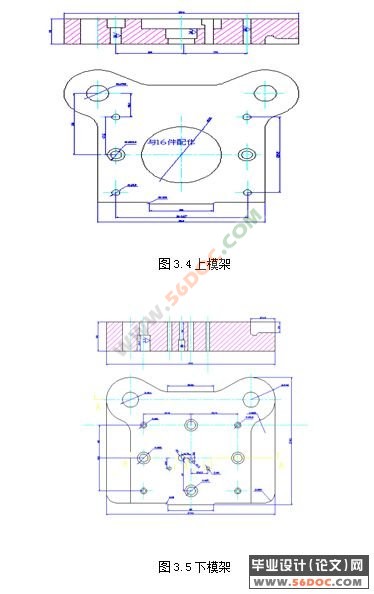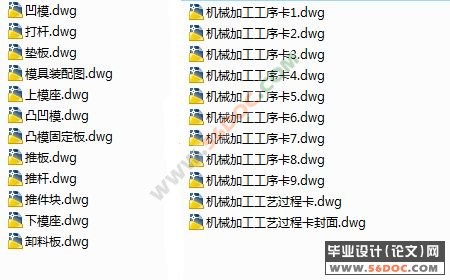后支架零件冲压模具设计(精品)☆
无需注册登录,支付后按照提示操作即可获取该资料.
摘要:模具是现代工业生产中应用广泛的优质、高效、低耗、适应性很强的生产技术或称成型工具、成型工装产品,是技术含量高、附加值高、使用广泛的新技术产品,是价值很高的社会财富。
本课题的主要任务是纺机摇架后支架的冲压工艺和模具设计。因为是纺机上的重要部件,精度要求比较高。采取的工艺方案是先落料—冲孔复合冲压,然后再弯曲,采用复合模生产。设计的过程是:首先进行工艺方案的论证和各种参数的计算,确定模具各主要部件的结构和尺寸,进行刃口尺寸的计算和相关件的强度校核;查阅相关书籍,选取模具的标准零件;然后根据计算的参数绘制模具装配图和非标零件图,再撰写说明书。
关键词:复合冲压,复合模,弯曲,模具设计
Textile Machinery Parts cradle after the stent design and manufacture of stamping dies
Abscract:Mold is a modern industrial production of a wide range of high-quality, high-efficiency, low consumption and strong adaptability of the production technology, or molding tools, Prototyping Tool products, high technological content and high added value, the wider use of new technology products, is the high value of social wealth. The main task of the issue is Textile Machinery Swing stamping process and die design. As the important components, textile needs high precision. The program is the first of blanking-punching composite punch, then bending modulus composite production. The design process: First, the program for the verification process and the various parameters, Die identify the major components of the structure and size, Cutting Edge for the calculation of the size and intensity of the relevant pieces of the check; Access to the relevant books, To Die standard components; Then calculated the entries drawn die assembly and non-standard components map, Further written statement.
Keyword: Stamping compound,Compound,Die Bending,Mold Design
本文主要研究内容
1.绘制零件图,收集、查阅有关资料,外文资料翻译(6000字符),撰写开题报告;
2.对零件进行冲裁/弯曲工艺分析,确定工艺方案;
3.计算、确定冲压力模具工作部分尺寸及公差,选取模具结构;
4.设计冲孔落料复合模具或级进模一套,绘制装配图,拆绘主要零件图;
5.任选模具一个主要工作零件,进行机加工艺规程设计;
6.撰写毕业论文、毕业设计审查、毕业答辩。





目 录 12000字
1 绪论 1
1.1 背景 1
1.2 冷冲模成型的特点 2
1.2.1 冲裁模 3
1.2.2 弯曲模 4
1.2.3 拉深模 5
1.2.4 多工位级进模 6
1.3 冷冲模具的发展趋势 6
1.4 本文主要研究内容 8
2 工艺方案的选择 9
2.1 零件的工艺性分析 9
2.2 模具的结构形式 10
2.2.1 冲裁力和弯曲力的计算 11
2.2.2 卸料力、推件力和顶件力的计算 12
2.3 制定冲压的工艺卡 13
3 冲压模具设计 14
3.1 排样 14
3.2 模具压力中心的确定 15
3.3 压力机的选择 16
3.4 模具主要零部件的设计 16
3.4.1 冲孔凸模的结构设计 17
3.4.2 凸凹模的结构设计 20
3.5 冲压模具标准件的选择 21
3.5.1 模架的选择 21
3.5.2 挡料销 23
3.5.3 卸料装置 23
3.5.4 推件装置 24
3.5.5 导向零件设计与标准 25
3.5.6 模柄的选用 25
3.5.7 凸模固定板与垫板 26
3.5.8 冲压模具的结构图 28
结论 29
参考文献 30
致谢 31
附录 A 32
